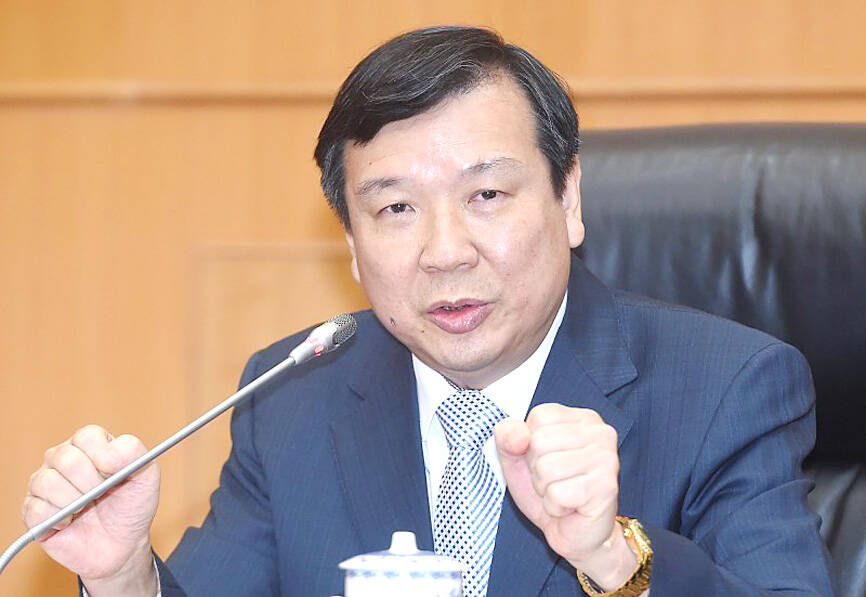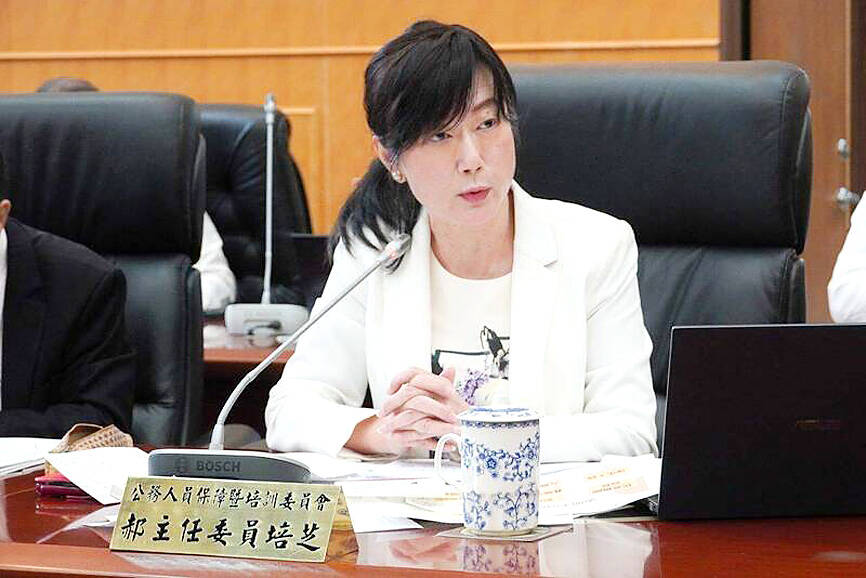Former Examination Yuan vice president Lee Yi-yang (李逸洋) is expected to replace Frank Hsieh (謝長廷) as representative to Japan when Hsieh steps down this year, sources said yesterday.
Lee, 69, has also served as head of the Civil Service Protection and Training Commission, senior adviser to the Presidential Office under former president Tsai Ing-wen (蔡英文), minister of the interior and head of the Directorate-General of Personnel Administration during the tenure of former president Chen Shui-bian (陳水扁).
Commenting on the possible appointment, Taiwan Society of Japan Studies chairman Kuo Yu-jen (郭育仁) said that President William Lai (賴清德) trusts Lee, someone Japan would also feel confident about.

Photo: Taipei Times file
“Taiwan-Japan relations have been stable over the past eight years under Hsieh, and economic exchanges between Taiwan and Japan have become more frequent,” Kuo said, citing the establishment of a Taiwan Semiconductor Manufacturing Co (台積電) factory in Japan’s Kumamoto Prefecture.
However, Lee might face challenges in the areas of business and politics, he said.
For example, Lee has no experience in industry, which could make it difficult for him to interact with and establish connections in the Japanese business community, Chen said.

Photo: Taipei Times file
In terms of politics, it is still unclear whether Japanese Prime Minister Fumio Kishida would retain his position as head of the Liberal Democratic Party (LDP) when it holds its leadership election in September, Kuo said.
“However, the relationship between the Democratic Progressive Party and the LDP has become very close, and it should not be a problem for Taiwan, even if the LDP changes leadership,” he said.
In related news, Lai yesterday recognized late Japanese prime minister Shinzo Abe for “always lending a helping hand to Taiwan when it was in need,” in a video commemorating the former leader, who was assassinated while giving a speech in Nara, Japan, on July 8, 2022.
“His memory, and Taiwan’s gratitude toward him, will live on forever. It is Taiwan’s pineapple production season, which reminds me of Abe’s smile when he was promoting Taiwanese pineapples,” Lai said.
Abe had advocated for a free and open Indo-Pacific region, and peace and stability across the Taiwan Strait, Lai said, adding that those ideas had a profound effect on international attention toward Taiwan and the region.
Separately, Hao Pei-chih (郝培芝), head of the Civil Service Protection and Training Commission, is expected to replace Francois Wu (吳志中) as representative to France, a source said yesterday.
Hao, who received her master’s degree and doctorate in political science at Paris 1 Pantheon-Sorbonne University, previously served as a member of the advisory committee at the Mainland Affairs Council from 2007 to 2009.
During Wu’s tenure, the French National Assembly voted overwhelmingly in support of Taiwan’s participation in international organizations. Wu has also been highly praised by legislators from both the ruling and opposition parties in Taiwan.
Hao would likely face great challenges with the increasing influence of far-right parties in French politics, the source said.
The Ministry of Foreign Affairs yesterday said it could not yet confirm who Hsieh’s or Wu’s replacements would be.

INVESTIGATION: The case is the latest instance of a DPP figure being implicated in an espionage network accused of allegedly leaking information to Chinese intelligence Democratic Progressive Party (DPP) member Ho Jen-chieh (何仁傑) was detained and held incommunicado yesterday on suspicion of spying for China during his tenure as assistant to then-minister of foreign affairs Joseph Wu (吳釗燮). The Taipei District Prosecutors’ Office said Ho was implicated during its investigation into alleged spying activities by former Presidential Office consultant Wu Shang-yu (吳尚雨). Prosecutors said there is reason to believe Ho breached the National Security Act (國家安全法) by leaking classified Ministry of Foreign Affairs information to Chinese intelligence. Following interrogation, prosecutors petitioned the Taipei District Court to detain Ho, citing concerns over potential collusion or tampering of evidence. The

‘FORM OF PROTEST’: The German Institute Taipei said it was ‘shocked’ to see Nazi symbolism used in connection with political aims as it condemned the incident Sung Chien-liang (宋建樑), who led efforts to recall Democratic Progressive Party (DPP) Legislator Lee Kun-cheng (李坤城), was released on bail of NT$80,000 yesterday amid an outcry over a Nazi armband he wore to questioning the night before. Sung arrived at the New Taipei City District Prosecutors’ Office for questioning in a recall petition forgery case on Tuesday night wearing a red armband bearing a swastika, carrying a copy of Adolf Hitler’s Mein Kampf and giving a Nazi salute. Sung left the building at 1:15am without the armband and apparently covering the book with a coat. This is a serious international scandal and Chinese

Seventy percent of middle and elementary schools now conduct English classes entirely in English, the Ministry of Education said, as it encourages schools nationwide to adopt this practice Minister of Education (MOE) Cheng Ying-yao (鄭英耀) is scheduled to present a report on the government’s bilingual education policy to the Legislative Yuan’s Education and Culture Committee today. The report would outline strategies aimed at expanding access to education, reducing regional disparities and improving talent cultivation. Implementation of bilingual education policies has varied across local governments, occasionally drawing public criticism. For example, some schools have required teachers of non-English subjects to pass English proficiency

TRADE: The premier pledged safeguards on ‘Made in Taiwan’ labeling, anti-dumping measures and stricter export controls to strengthen its position in trade talks Products labeled “made in Taiwan” must be genuinely made in Taiwan, Premier Cho Jung-tai (卓榮泰) said yesterday, vowing to enforce strict safeguards against “origin laundering” and initiate anti-dumping investigations to prevent China dumping its products in Taiwan. Cho made the remarks in a discussion session with representatives from industries in Kaohsiung. In response to the US government’s recent announcement of “reciprocal” tariffs on its trading partners, President William Lai (賴清德) and Cho last week began a series of consultations with industry leaders nationwide to gather feedback and address concerns. Taiwanese and US officials held a videoconference on Friday evening to discuss the